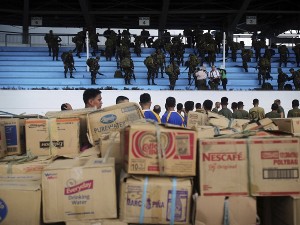Trusted NGOs should handle relief goods distribution – int’l group

Philippine soldiers stand near relief supplies for victims of Typhoon Haiyan at Villamor Airbase. AP FILE PHOTO
MANILA, Philippines – Relief goods are likely to end up in the hands of people who will only take advantage of it unless coursed through trusted non-government organizations (NGOs) that adhere to international standards.
“This is what essentially happens when relief goods are not given to the hands of United Nations (UN) agencies or trusted partners,” Carin van der Hor, Country Director of Plan International Philippines, said in an interview at the sidelines of the Canadian Embassy’s press conference on additional relief funds for survivors of Super Typhoon “Yolanda” (international name Haiyan).
The Department of Social Welfare and Development (DSWD) recently filed charges against an eatery owner in Tacloban City who was found selling sacks of rice meant for distribution as relief goods.
“We have also heard before that relief goods have been given to representatives of municipalities or villages without any monitoring of who’s actually getting what. There is definitely a potential [for relief goods to be exploited],” she said.
Luiza Carvalho, UN Resident Coordinator and Humanitarian Coordinator, said that they have strict systems for the storage and reporting of relief goods that go through them to ensure nothing will be lost that may end up in hands of abusive individuals.
Article continues after this advertisementThe World Food Program (WFP), which coordinates with the UN and its international NGOs partners, “has very strict reports and regular follow-ups on the stocks of relief goods [available],” Carvalho said.
Article continues after this advertisement“You have to place the goods in a way that they don’t get rotten and that they can be used as soon as possible. There is a system in place so that you can prevent losses of food,” she said.
Hor said that such incidents where relief goods are abused do happen in during the rehabilitation efforts after disasters and calamities.
“These are not the beneficiaries selling the relief goods. These are people who don’t need it but somehow gotten their hands on relief goods and are using it to make some extra money,” Hor said.
“Unfortunately it happens and it can happen again if you don’t go to trusted partners or organizations that have professional standards or adhere to international standards … you run the risk of relief goods being given to people who don’t need it,” she said.
With the rush of international organizations and foreign donors in getting aid to the Philippines after Yolanda, it is best to make sure first that the people being given relief goods are the ones who really need those supplies.
“We don’t have any indications that relief goods were stolen but it’s possible that relief goods were given to the wrong people, with the best of intentions,” Hor said.
“You can imagine [an international NGO who is] new to the Philippines and who hasn’t worked here before and somebody presents himself as a representative of a barangay (village) or municipality and you really want to help, you might trust that person,” she said.
Hor advised that taking a few extra hours to validate the needs of the people is better than letting relief goods get into the wrong hands.
RELATED STORIES
‘Yolanda’ sparks Philippine child trafficking fears – charity
PH on guard against child trafficking post-‘Yolanda’
UN exec renews appeal for $788-M ‘Yolanda’ aid